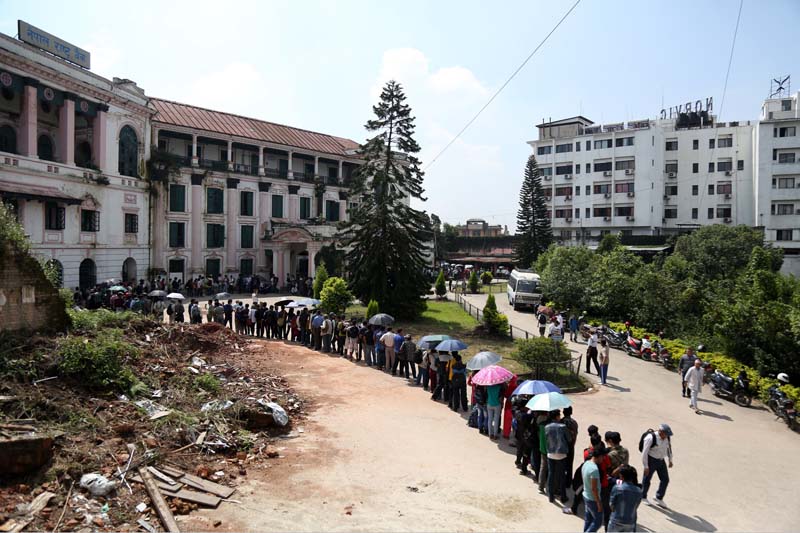
How is Nepal's banking system keeping people poor ?
On October 08, 2024, I visited a bank with a simple task—deposit NPR 27,000. It should have been a quick, straightforward transaction. Instead, it took 45 minutes of my time. This experience made me realize that it's not just about the money anymore. It's about the time being lost, and in today's world, time is just as valuable as money.
Nepal’s banking system, in its current state, is not just inefficient; it’s holding people back. And it's not just an individual issue—it's a nationwide problem that perpetuates poverty.
Outdated Systems in a Modern World
Banks in Nepal still operate with systems that seem to be stuck in the past. Long queues, outdated paperwork, and manual processes dominate the scene, leaving people frustrated and drained. Where banking should be an enabler of economic progress, it has become a burden on the lives of the everyday Nepalese.
It’s no longer acceptable for simple banking tasks, like depositing or withdrawing money, to take hours. Imagine the compounded effects this has on people who rely on daily wages or manage small businesses. Every minute lost at the bank is a minute not spent earning, creating a vicious cycle where financial growth is stunted before it even has a chance to begin.
The World is Moving Forward. Why Aren't We?
Globally, banking has evolved into something seamless and efficient. From mobile banking apps to advanced online services, the rest of the world is making it easier for people to access their money, move it around, and invest it. However, Nepal is lagging behind.
Many banks abroad have transformed into hubs of efficiency—whether it’s depositing large sums through ATMs, quick teller services, or digitized paperwork. For instance, many countries now have self-service kiosks, eliminating the need for people to interact with bank employees for simple transactions. This cuts down waiting times and improves the overall customer experience. Why can't we adopt these solutions here?
Nepal’s banking system, both in terms of physical infrastructure and digital innovation, is years behind. We need to learn from the rest of the world and adapt. We can no longer afford to be stuck in outdated, inefficient systems that eat away at people's time.
The Real Cost of Inefficiency
For many Nepalese, particularly in rural areas, time is a luxury they can't afford to waste. Many small businesses, farmers, and daily wage workers rely on every minute of their day to make ends meet. When they lose hours at the bank, they lose income. They lose opportunities. They lose their chance to break free from poverty.
Nepal’s current banking system, with its sluggish processes, directly contributes to this cycle. The time wasted standing in queues or filling out redundant paperwork could be time spent on income-generating activities. It’s no wonder that people feel stuck when basic services, like banking, are so time-consuming.
Authorities Must Act: A Call for Research and Development
It’s time for the responsible authorities—government bodies, banking regulators, and financial institutions themselves—to step up and drive change. We must research and develop more efficient physical banking systems. Nepal has an opportunity to modernize its banks by drawing inspiration from global practices, improving both the customer experience and the economic impact.
We need banks that are enablers, not burdens. Whether it's by reducing waiting times, streamlining processes, or implementing innovative technologies, the change must come. Banking should support people, helping them manage their finances swiftly, securely, and with minimal disruption to their daily lives.
The shift can start by:
- Implementing self-service kiosks for deposits and withdrawals.
- Introducing automated paperwork and digital queues for quicker in-person banking.
- Developing better digital banking systems that allow more transactions to be done remotely.
- The authorities must recognize that a more efficient banking system is not just about convenience. It's about empowering people to use their time more productively, improve their financial standing, and ultimately contribute to the nation’s economic growth.
Banking Should Be a Catalyst for Progress, Not a Barrier
The way forward is clear. We need swift and decisive reforms in Nepal’s banking system. We need innovation, inspired by global best practices, that makes banking in Nepal efficient, accessible, and most importantly, time-saving.
I urge the decision-makers to take this issue seriously. Conduct the necessary research, develop the right solutions, and transform Nepal’s banks from burdensome institutions into engines of economic growth. People deserve better, more efficient banking that supports their financial aspirations rather than holding them back.
Co-authored by chatgpt
